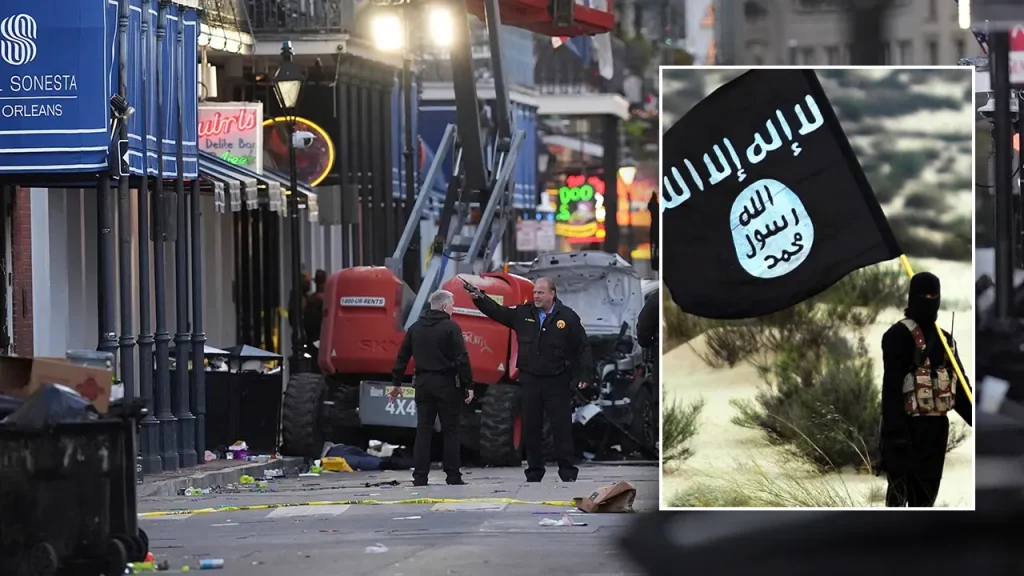Investigators have revealed that Shamsud-Din Jabbar, a former Army veteran who served in Afghanistan, carried out the deadly New Year’s Day terror attack in New Orleans. He flew an ISIS flag on the back of the pick-up truck he used to mow down innocent revelers, killing at least 14 of them. Jabbar had joined ISIS before the attack, posting several videos on Facebook declaring support for the group. FBI Deputy Assistant Director Christopher Raja stated that Jabbar initially planned to harm his family and friends but was concerned the news headlines would not focus on the ‘war between the believers and the disbelievers.’
ISIS, also known as the Islamic State in Iraq and Syria, is a breakaway terrorist group from al-Qaeda that has conducted and inspired terrorist attacks around the world. With a goal of establishing a global caliphate governed by a strict interpretation of Sharia law, the group has been responsible for thousands of deaths and injuries across different regions. Under the leadership of former leader Abu Bakr al-Baghdadi, ISIS seized substantial amounts of territory in Iraq and Syria by 2014. While Baghdadi was killed in 2019 and U.S.-backed forces declared victory over ISIS, the group continues to operate clandestinely in the region. The roots of ISIS can be traced back to 2004 when an Iraqi extremist network merged with al-Qaeda to form its predecessor group.
In the United States, ISIS has inspired several terror attacks in the past decade, including the infamous Pulse Nightclub massacre in 2016 where 49 people were killed. There have been instances where lone wolf attackers have committed acts of violence in support of the group’s ideology. Some experts suggest that ISIS’s power today is partly driven by its brand, inspiring both militant groups and individuals to carry out attacks. In the U.S., attacks such as the 2015 San Bernardino shooting, 2017 NYC bike path attacks, and the 2017 New York City subway bombing have been linked to ISIS-inspired ideologies. These attacks have left several people dead or injured, with perpetrators often expressing allegiance to the group during or after the incidents.
Shamsud-Din Jabbar’s deadly New Orleans attack joins the list of ISIS-inspired incidents in the U.S., with at least 14 people losing their lives. The suspect, a 42-year-old U.S. citizen from Texas, drove a rented Ford truck laden with an ISIS flag, weapons, and a potential improvised explosive device into a crowd. Jabbar carried out the attack in the early hours of New Year’s Day, injuring more than 30 people before being killed in a shootout with police. The incident highlights the ongoing threat of terrorism inspired by extremist ideologies in various regions, with individuals like Jabbar carrying out heinous acts in the name of ISIS.
In the past decade, ISIS-inspired attacks have left a trail of destruction in the U.S., with incidents like the 2016 Ohio State University attack and the 2017 New York City subway bombing. Perpetrators have been driven by online propaganda glorifying violent acts against Americans, with some expressing support for known terrorist groups like al-Qaeda and ISIS. These attacks blur the line between random acts of violence and coordinated terrorist plots, spreading fear and panic among communities. The challenge for law enforcement agencies lies in tracking and preventing such attacks, deterring individuals from succumbing to extremist beliefs that promote violence and hatred.
Despite efforts to dismantle ISIS and eliminate its leadership, the group remains a global threat with the potential to inspire violence and terror across different regions. The complex nature of modern terrorism, with decentralized networks and lone actors operating independently, poses a significant challenge for counterterrorism efforts. Understanding the roots of ISIS’s ideology and its impact on vulnerable individuals is crucial in preventing further attacks and ensuring the safety and security of communities. As investigations continue into the New Orleans attack and other incidents, law enforcement and intelligence agencies remain vigilant in identifying and addressing emerging threats posed by extremist groups like ISIS.


